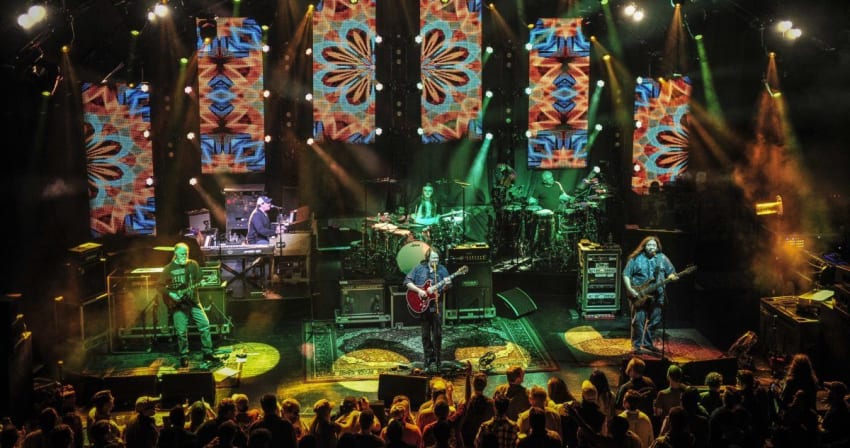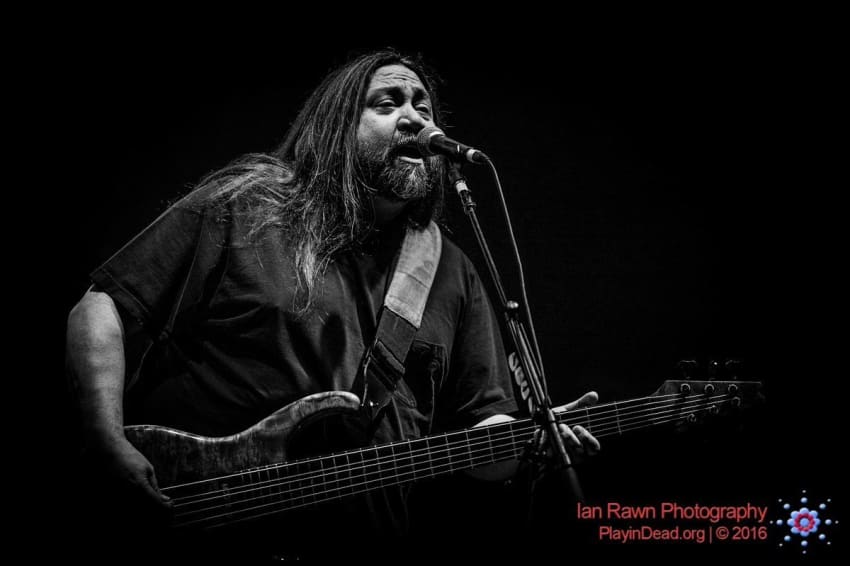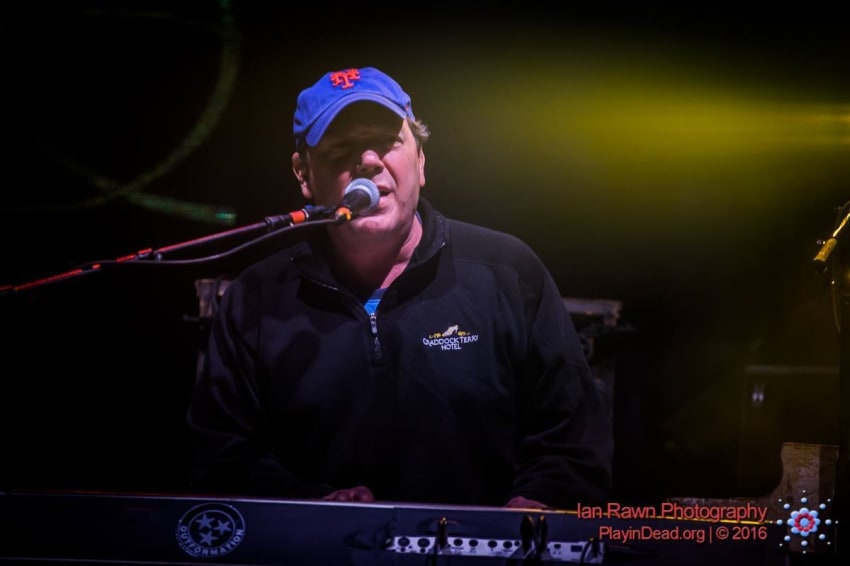30 Years Of Widespread Panic: John Bell, Dave Schools & Duane Trucks Look Back – And Ahead
By Chad Berndtson May 19, 2016 • 9:02 am PDT

Photo by Andy Tenille
This year marks the 30th anniversary of Widespread Panic’s formation and JamBase senior writer Chad Berndtson recently spoke with members of the band for the feature below. Head here to read John Bell’s thoughts on constructing setlists over the years, follow this link for Dave Schools’ memories of Red Rocks and check out Duane Trucks insights on learning the band’s mighty repertoire.
“Thirty years is a long time, and it’s been an interesting and rough and fulfilling last couple of them,” said Widespread Panic bassist Dave Schools. “It’s time to pull back a little for sure so that we can concentrate on other things that are important to us. That’s how we keep this world fresh for us. We’ve done over 3,000 shows. We’ve definitely paid our dues.”
Widespread Panic is 30 years old. Take a minute to let that sink in.
No band that’s been together this long and that has this devoted a fanbase is without heartache or baggage, and Panic has experienced plenty of both, especially in the last 15 years of its existence.
Indeed, assessing Panic’s position in 2016 means acknowledging two elephants in the room: first, the brief return and then abrupt departure of drummer and founding member Todd Nance in February following Panic En La Playa, and second, the recent comments by band members that in 2017 WSP will be scaling back the length and frequency of its tours, picking its spots in select markets instead of canvassing the country.
If fans have overthought the band’s comments on touring – well, says frontman John Bell, that’s in the eye of the beholder.
“It’s still going to be Widespread Panic as usual in the offices,” the typically philosophical Bell offered. “But we will have a little bit more time to do other stuff, whether it’s side projects or being at home with our families. There will be plenty of us – a lot of chances to come see us. It just won’t be filling up the schedule with as many gigs as we can. We’re going to play. We’re not going to play as many gigs.”
In separate interviews, Bell and Schools described Panic in 2017 in almost identical terms: fewer overall shows, but the same touchstones and the strong likelihood of multi-night stands in favored markets.
“We’re going to play some fewer gigs, but they’ll be select gigs,” Bell explained. “We’re going to do Red Rocks, we’re going to do Halloween, we’re going to keep playing some places that we really dig and that have been really consistent for us over the years. Some of those might be destination gigs in that they’ll be fun towns where we do multiple night shows, that kind of thing. It’s not set in stone.”
“It’s all part of a greater plan to give more impact to it when we do perform,” said Schools. “You’ll have plenty of opportunity to come see us play.”
That’s the latter elephant. The former elephant – Nance’s departure – is something the band is done discussing, particularly with the press.
“It’s family business. I apologize for saying that like that, but I’m not that apologetic,” Bell said. “It’s beautiful that folks … Well, it’s neat that they go beyond the music and want to know more and want to kind of be behind-the-scenes. But we don’t really see it like that. What you get from us on stage is what we’re trying to offer you.”
Added Schools: “We love Todd Nance. This is very personal. But people are going to speculate whether you put the hard-boiled truth right in front of them or not. That’s the media culture that’s been created, where you can’t distinguish what’s truth from what’s not. So we let the music speak for itself.”
Letting the music speak is exactly what the band has done in the first half of 2016. Having just wrapped a successful spring tour with a blowout three-night stand in Chicago, they now look ahead to summer, where some of their biggest shows and grandest traditions await, including a traditional stand at Red Rocks toward the end of June.
Panic’s Future
The 30th anniversary of a band this storied prompts a number of questions, not least: What will it look like by the time their 35th anniversary rolls around? How about their 40th?
Schools chuckles a bit. “I’m just trying to keep the AARP magazine out of my mailbox,” the bassist said. “Look, we love playing music. We love the experience we get to have nightly with our audience. It’s a matter of how can we keep that fresh for everyone, and one of the formulas I’ve come upon, at least personally, is going out to produce someone else’s record or do some solo project or side thing. I get some new input, and I bring that to Widespread Panic. JoJo [Hermann] does that too, so does Jimmy [Herring]. We come back together, we welcome each other’s new spices.”
“This is all still a work in progress,” Schools adds. “This stage is yet another step in that ongoing experiment.”
Not that 30 isn’t something to stop and reflect upon.
“I do take my moments,” Bell offered. “Often my mind goes back to when we first started and comes into where we are now. That’s pretty hip. When you’re first starting you don’t know how long it’s going to last. When you look back at 30 years, you find those were the building blocks, all that you were doing back then.”
The goal now is the same as then, say Bell and Schools: write new and good songs and create an exciting live experience.
“You want to make an environment and maintain an environment where you’re happy to see each other. Yeah, go out on the ball field and kick a little ass but have some fun at the same time,” Bell said. “That’s the way it’s always been here.”
Both are somewhat noncommittal about things they’d like to see Panic do as the band heads toward their middle-30s.
“There are probably geographic locations we’d like to get to – plenty of places we’ve never played, like Hawaii. That would be kind of hip, to have played all 50 states,” Bell said. “But that’s little stuff. We’re not here to challenge the way we’ve always approached this. We’re still just a rock ‘n’ roll band. We can get away with a lot of stuff but that’s what we are.”
One thing they can agree on is that the band’s played more great nights than off nights lately.
“It’s so subjective – it’s an individual experience, but it can also be undeniable when you look at each other and know everyone is firing on all cylinders, the audience is locked in and feeling every beat. That keeps us coming back,” said Schools. “There’s no formula. It’s unpredictable. All you can really do is set up a situation that will allow that to happen, and hope your fans understand that. That’s the carrot we offer.”
Trucks Gets The Nod
Panic at 30 is a long-established framework. And into that long-established framework came drummer Duane Trucks, who cut his teeth – like most southern musicians in jam band circles – under Col. Bruce Hampton, and built his reputation through a number of bands, including his former act Flannel Church and his ongoing collaboration with Schools as part of Hard Working Americans.
Sometime around 2014 – perhaps non-coincidentally, the year he got tapped as a last-minute fill-in for Widespread Panic’s Fall Tour – Trucks was getting his own notices, no longer always introduced as “Derek Trucks’ younger brother” but as a commanding drummer who could hold his own on a big stage.
Trucks’ rapport with Panic came quickly, not least because of his longtime relationships with all of the band members – including Herring, whose daughter is Trucks’ wife – but also musically with Schools, who along with Trucks and percussionist Sunny Ortiz forms Panic’s raging, elastic rhythm section.
“For him it was coming in to an emergency situation – so that’s part of it, but there was a lot of simpatico right away,” Schools explained. “He gets the gravitas of it, he gets the spirit of it. He’s been through the same Col. Bruce School that we all have. He’s not out to steal the show or do anything other than serve the song.”
Duane, said Schools, “came into a lose-lose situation and made it a win. I warned him. I said, ‘we’re offering this to you, but don’t say yes right away. Think about the ramifications and understand we don’t really know what’s going to happen.’”
“Don’t Look Down”
“When it first happened it was one of those things where you just kind of don’t look down,” the affable Trucks told me. “I didn’t think about the amount of music I had to learn – it was so last minute anyway, I think it was maybe 10 days from the day I was asked to the very first gig I had to play, and I knew so little of their catalog, maybe five or six songs. So when I figured out that we play about 25 songs a night, and we don’t repeat a song for three shows, that meant learning at least 75 to 80 songs before the first gig.”
“He put in the work,” Schools added. “He’s been out there, working his ass off. He’d be with us on [Hard Working Americans] tours listening to Panic stuff, all the time.”
Trucks said the band didn’t exactly take it easy on him, but at the same time, couldn’t have been more welcoming.
“They’re flexible,” he said of his Panic mates. “They’ve been sweet and open-minded. When I got here, the only advice they gave was just to really relax into the role. That’s one of the most beautiful things about this music because it’s an energy exchange with the crowd – it’s this incredible vibe thing. At times it can be very frantic, wild and crazy. And now that I’ve learned the lion’s share of the catalog, that energy is what’s kept me going with it. This was something to dig into, and wouldn’t have worked without 100 percent given from everybody.”
With the music served, Trucks said he also benefited by being all business in his approach to what, for any drummer, would be a difficult situation.
In addition to his band mates – especially Herring, who’d been in a similar, although circumstantially far different, position 10 years earlier – Trucks sought advice from Derek Trucks, a firsthand source of being new blood in a band defined by old traditions.
“We had a lot of different talks,” Duane said of his discussions with Derek. “He talked to me about the mindset, having gone into The [Allman] Brothers when he was young and not knowing if that would be temporary or long-term. What I got from that was the advice to do what feels the best to you, and be as professional and as well-rounded as possible. All I can do is make the best decisions based on what’s transpired.”
Trucks, for his part, has not spoken to Nance since he was re-installed in Panic’s drum spot in February.
“That’s not my place,” he said. “If down the road that’s something that’s appropriate, maybe. But I’ve known the dude since I was young and I respect whatever the band wants to keep private and between them.”
Worlds Left to Conquer
For all that’s swirling – and could be swirling — the band seems comfortable in its current state: a simpatico vibe that underpins its live shows and found its way back into the band’s recorded output, too. Street Dogs, which came out last fall, is Panic’s 12th studio album and among its best – consistent in terms of both fully-realized songs that also translate well into their dynamic live shows and styles that encompass all of what they do, from dirty-groove blues to soulful folk-rock framed by spiritual quandaries.
In other words, if they’re at all worried about what the future holds now that they’ve hit and passed 30, they’re not showing it.
“Once people started asking us those questions about the 25th anniversary, then I really started to think about it. I mean, we just love what we do so much that the years flew by, I guess with studio albums as the markers along the way,” Schools says. “It’s kind of a big gray blur – it’s like that line in ‘Stella Blue’ about having stayed in every blue-light cheap motel. We’ve done it, man. We go to places and I’ll be like, I remember when there was a Days Inn here, and I also remember when we thought Days Inns were the paradigm of paradise. We’re still here.”
Loading tour dates






